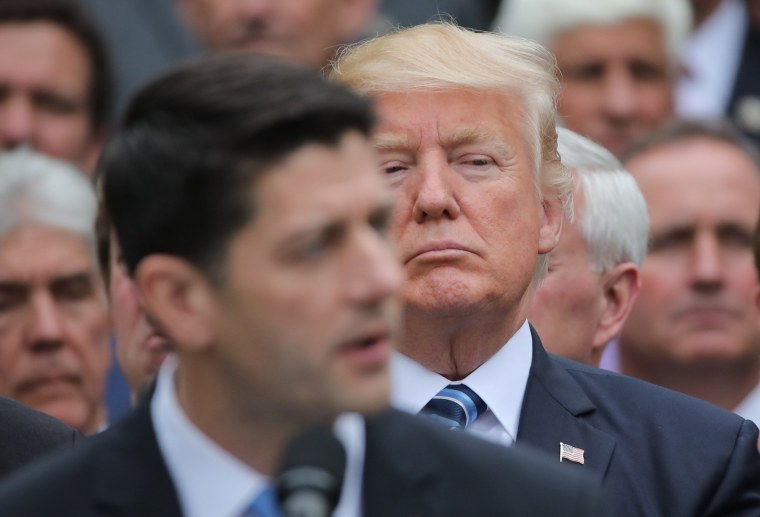After Donald Trump announced new tariffs targeting our allies and neighbors, congressional Republicans were "gobsmacked." The policy goes against everything the GOP believes about trade and economics, and the president's ostensible allies on Capitol Hill -- from Republican leaders to rank-and-file members -- made clear they saw this as an important White House mistake.
Some are doing more than just complain. The Washington Post reported overnight:
Sen. Bob Corker (R-Tenn.) introduced a bipartisan bill Wednesday that would give Congress new authority to check the president's trade moves, going forward with the legislation despite a personal appeal from President Trump to back off.Corker's bill would require congressional approval when the president enacts tariffs under the auspices of national security, as Trump did last week in imposing levies on aluminum and steel imports from Canada, Mexico and the European Union.
The bill was introduced with a bipartisan lineup of 12 co-sponsors, ranging from progressive champions like Hawaii's Brian Schatz (D) and Maryland's Chris Van Hollen (D), to conservative diehards like Utah's Mike Lee and Pennsylvania's Pat Toomey.
The bill was also quickly endorsed by the U.S. Chamber of Commerce, a prominent Republican ally.
And yet, GOP leaders are already rejecting the plan, even while claiming to oppose Trump's policy. Senate Majority Leader Mitch McConnell (R-Ky.) said yesterday he's concerned about the president's policy having an adverse impact on his own state's economy, but added, in reference to Corker's proposal, "It'd be an exercise in futility because he wouldn't sign it."
Similarly, a reporter asked House Speaker Paul Ryan (R-Wis.) about Congress taking steps to reverse Trump's move. "You would have to pass a law that he would want to sign into law," Ryan replied, adding, "You can do the math on that."
Well, yes, we can do the math -- and the arithmetic suggests McConnell and Ryan may be mistaken.
For now, let's put aside the oddity of hearing these two GOP leaders insist that Congress should only tackle legislation the White House is inclined to support. They didn't seem to feel that way in the Obama era -- how many dozens of votes did they hold on ACA repeal? -- but let's not dwell on recent history.
Instead, let's remind Congress' most powerful Republicans that the legislative branch has a remedy for dealing with a president who vetoes popular bills: lawmakers can override a veto.
Specifically on the issue of Congress, presidents, and tariffs, there's some precedent to keep in mind: as we discussed the other day, in his final year as president, Jimmy Carter created oil tariffs, which Congress -- led by a Democratic majority -- quickly overturned.
There's no reason this couldn't happen again. It's a matter of political will, not institutional constraints.
And in this case, the political will is pretty one-sided: Trump's tariffs have very few proponents on Capitol Hill. Corker's bill, or one like it, would likely pass with considerable bipartisan support. Enough to override a presidential veto? I think that's likely, but there's only one to find out.
So what do you say, Mitch McConnell and Paul Ryan? If you agree with the Corker bill on the merits, why not give it a try? What's Trump going to do, tweet at you?
